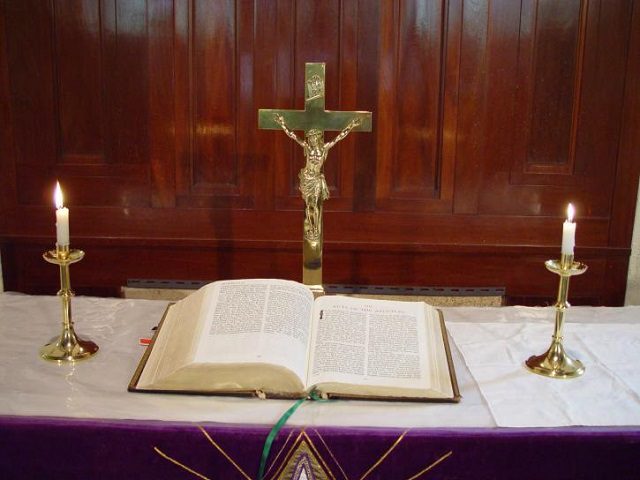[from Public Domain Images]***
(5-28-12)***
This was on a public Facebook discussion thread on a friend’s Facebook page, underneath mention of a review of the above book of mine by Devin Rose. Greg Still describes himself as a “”skeptical Pentecostal” and is a former Catholic. His words will be in blue.
* * *
Oddly, he also believes in Sola Scriptura. (He cannot be accused of being consistent)
This is perfectly consistent. Most Protestants don’t deny the usefulness; even necessity of the Church and creeds. They only deny that any church or tradition is infallible. Only the Bible is that. This is what sola Scriptura means: “the Bible is the only infallible and final authority.” But of course in practice that means: “I am the final authority, since I ultimately interpret the infallible Bible as I see fit and can dissent against any church if necessary to preserve truth as I see it.” That is filled with difficulties and self-contradictions, as I show in my book. Luther himself appealed to Church tradition and authority. The only problem is that he reserved the right to disagree with what the Church says. Protestantism is always [in the final analysis] a self-defeating proposition, in terms of authority, anyway you slice it.
*
We do, after all, have the words of the Apostles. It seems that their letters should be given the most weight over any ecclesiastical tradition.
But sola Scriptura is directly contradicted in Scripture, and there are things (like the canon of Scripture) that are not present in the Bible at all. Zip, zero, zilch, nada.
The irony of your book is that you use the Bible as your ultimate authority to defend the Catholic teaching that the Church, not the Bible, is the ultimate authority.
Do you see the problem here?
Yes: in your comment, which is neither factual, nor logical. First of all, I’m not using the Bible as the “ultimate authority”; only as an authority that Protestants and Catholics agree upon. It is smart in dialogue to start with a common premise and then move on to disagreements. I do that here, and often elsewhere. I show that the Bible does not teach sola Scriptura. I could do that if I were an atheist. My own beliefs have no necessary connection to the logic of that at all. I could argue that “the Koran doesn’t teach that elephants fly through the air.” To say that shows nothing [necessarily] about what I believe.
Nor is “Catholic teaching” what might be called sola ecclesia. It is not at all. Our view is that Bible-Church-Tradition are all of a piece: a “three-legged stool” of authority. But the Bible is inspired, whereas Church and tradition are infallible, so in that sense the Bible is “higher”; but in terms of authority all three are in play, and harmonious. You simply miscomprehend the Catholic view of the Bible and authority. You’re not alone; many millions do so.
I was raised Catholic – went to parochial school, and considered being a priest. Sorry, but I know Catholicism, and it cannot be supported Biblically. It must rely on the supposed “authority” or “infallibility” of the Church.
Sorry, you clearly don’t: at least not in these respects, because you have made a number of factual errors. Of course it can be supported biblically. I show that again and again in my writings. Not only can it be shown, but it can be demonstrated that Catholicism is far more in harmony with all of Scripture than any form of Protestantism.
The whole “authority/infallibility” argument fails with two words, WHICH CHURCH?
I agree that one must ask “which Church is the one true Church mentioned in the Bible?” We can demonstrate that the Catholic Church goes historically back to Christ, and has consistently espoused true Christian doctrine. We’re the ones who keep apostolic morality: things like no divorce and no contraception. No other major body has done so. If you want apostolic morality and doctrine, you have one choice. That’s a major reason why I became a Catholic, by the way. I was sick of Protestant compromise on crucial moral issues.
Or let us address your argument (in your book) that Peter had authority over Paul at the Jerusalem council. It NEVER says anything like that. This is made of whole cloth. Both Peter and Paul gave testimony, but it was James who stood and gave the final word, not Peter.
*
You want to bring up one of the arguments in my book. Very well, then. Rather than cynically portray what I said, and denying it with no substance, let’s let readers see what I actually wrote. Here is the entire argument #74 (a few minor differences from the book since this is from my last manuscript):
74. Paul’s Apostolic Calling Was Subordinated to the Larger Church and Was in Harmony with Peter
Paul’s ministry was not “self-validating.” He was initially commissioned by Peter, James, and John (Gal 2:9) to preach to the Gentiles. After his conversion, he went to Jerusalem specifically to see Peter (Gal 1:18). In Acts 15:2-3 we are told that “Paul and Barnabas and some of the others were appointed to go up to Jerusalem to the apostles and the elders about this question. So, being sent their way by the church,” they went off on their assignment.
That is hardly consistent with the idea of Paul being the “pope” or leading figure in the hierarchy of authority; he was directed by others, as one under orders. When we see Paul and Peter together in the Council of Jerusalem (Acts 15:6-29), we observe that Peter wields an authority that Paul doesn’t possess.
We learn that “after there was much debate, Peter rose” to address the assembly (15:7). The Bible records his speech, which goes on for five verses. Then it reports that “all the assembly kept silence” (15:12). Paul and Barnabas speak next, not making authoritative pronouncements, but confirming Peter’s exposition, speaking about “signs and wonders God had done through them among the Gentiles” (15:12). Then when James speaks, he refers right back to what “Simeon [Peter] has related” (15:14). Why did James skip right over Paul’s comments and go back to what Peter said? Paul and his associates are subsequently “sent off” by the Council, and they “delivered the letter” (15:30; cf. 16:4).
None of this seems consistent with the notion that Paul was above or even equal to Peter in authority. But it’s perfectly consistent with Peter’s having a preeminent authority. Paul was under the authority of the council, and Peter (along with James, as the Bishop of Jerusalem) presided over it. Paul and Barnabas were sent by “the church” (of Antioch: see 14:26). Then they were sent by the Jerusalem Council (15:25, 30) which was guided by the Holy Spirit (15:28), back to Antioch (15:30).
You make bald statements of denial; I make solid biblical arguments.
You, of course, know that Paul withstood Peter to his face for his hypocrisy on this very issue. Obviously Paul did not recognize Peter as having “papal” authority over him.
The Peter vs. Paul hypocrisy argument proves nothing because it is irrelevant (hypocrisy being distinct from authority). A person can have full authority and be a flaming hypocrite. For example, Republican ads against President Obama show him to be a hypocrite in a number of ways regarding what he has promised and what he has done. Assuming their correctness, they show he is a hypocrite, but they have no effect on his authority. He remains the President, and has that authority till we vote him out of office (or his term expires). Apples and oranges.
I note in this paper that Jesus upheld the authority of the Pharisees, even though they were hypocrites (Matthew 23:2). This flimsy, misguided objection proves nothing whatever regarding Peter’s primacy or supposed lack thereof.
Certainly, if Mary had been assumed, the Bible would have mentioned something about it.
By Protestant reasoning, “certainly, if sola Scriptura were true, the Bible would have mentioned something about it“. But it never does, which is the topic of my book. That doesn’t stop Protestants from making an entirely non-biblical, anti-biblical concept the very foundation and bedrock and pillar of their authority structure. They do it anyway. Then, having done that, they demand that we adopt the same illogical reasoning with regard to Catholic distinctives like Mary’s Assumption.
We never claimed that absolutely everything has to be explicitly laid out in Scripture, precisely because the Bible never teaches this. That is your game, and thus your burden to defend, not ours.
Your statement above is classic. You believe this firmly, yet the Bible never states such a thing. Thus, you supposedly appeal to the Bible itself with a completely non-biblical idea that can’t be found there. Then you try to bind Catholics to this silly notion: so now you are arbitrarily applying an arbitrary tradition of men to us, as if we have to play by those rules . . . We think logically and biblically, so no dice!














